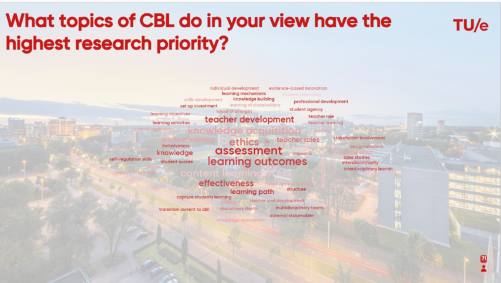Blog by Tim Stevens, Karolina Doulougeri, Jan Vermunt and Caroline Vonk (staff at TU/e)
On Wednesday 10 November Jan Vermunt gave the kick-off of a new 4TU.CEE webinar series on research into challenge-based education. Challenge-based education (CBE) is taking an increasingly important role in educational innovations in higher education, especially at the four technical universities. For CBE innovations to take root, it is important to research them properly. The webinar series aims to enhance the sharing of knowledge about research on CBE and boost the exchange among universities. In the kick-off webinar, Jan Vermunt gave a short talk about CBL research, which set the stage for an interactive session in which we explored research topics and methods together.
CBL at Eindhoven University of Technology
Jan Vermunt is professor of Learning Sciences and Educational Innovation at Eindhoven University of Technology (TU/e), Eindhoven School of Education. TU/e aims to educate the engineers of the future. At TU/e the term Challenge-based learning (CBL) is preferred over CBE. CBL plays a central role in TU/e’s educational vision of 2030, as it is seen as a model that helps to enhance student participation in defining their own learning trajectories, and to integrate sustainability and complex real-world problems in engineering education. The university is currently supporting various educational initiatives that experiment and implement CBL in practice, as well as research projects that study the effects of these innovations.
A problematic relation between research and practice
 In his talk, Vermunt explained how innovations tend to fade away when they are not supported by research. Enthusiasm for innovations is generally based on faith and beliefs. This can incite new initiatives but for innovations to take root and grow, systemic knowledge growth is needed. This includes evidence for its positive effects, but also an understanding of the underlying mechanisms to continuously advance education practices. Unfortunately however, many people experience a gap between educational research and practice. According to Vermunt, this is caused by the divide between fundamental and practice-oriented research, and the divide between research on students’ learning and on teachers’ teaching and learning.
In his talk, Vermunt explained how innovations tend to fade away when they are not supported by research. Enthusiasm for innovations is generally based on faith and beliefs. This can incite new initiatives but for innovations to take root and grow, systemic knowledge growth is needed. This includes evidence for its positive effects, but also an understanding of the underlying mechanisms to continuously advance education practices. Unfortunately however, many people experience a gap between educational research and practice. According to Vermunt, this is caused by the divide between fundamental and practice-oriented research, and the divide between research on students’ learning and on teachers’ teaching and learning.
A plea for research-informed educational innovation
In his view, we should aim for research-informed educational innovation, in which research and innovation go hand in hand. This means that research questions should originate from practice, that the research is done in practice and that the research findings are relevant for practice. At the same time, theory building is needed to be able to interpret research findings, explain underlying mechanisms and systematically build a knowledge base that may also be relevant for practitioners at other places and times.
Connecting research domains
Student learning and teacher learning are often studied separately, from different theoretical perspectives and within different scientific communities. As a consequence, research on learning and instruction often has little impact on teachers’ teaching practice and research on teachers and their teaching often has little impact on students’ learning. To combine these research approaches, it is important to cross traditional boundaries, develop overarching multi-layered models, and develop long term research projects in which both students’ learning and teachers’ teaching and learning are included.
Collaborations at TU/e and beyond
 To bridge the gap between fundamental and practice-oriented research and between various research domains collaboration is needed. At TU/e, various research and development projects are taking place in which visionaries, educational researchers, teacher-researchers, teachers, education professionals and students collaborate. Questions about the design of CBL, students’ learning in CBL, the pedagogy of CBL, learning gains in CBL, assessment, the roles of teachers and their professional development are studied coherently. People have joined forces in a CBL research community, to frequently exchange experiences and collectively build a knowledge base for CBL research. Also the knowledge exchange across universities is in development, through cooperation within 4TU.CEE and the Alliance TU/e – UU – WUR. However, for a systemic knowledge base more collaboration across universities is needed.
To bridge the gap between fundamental and practice-oriented research and between various research domains collaboration is needed. At TU/e, various research and development projects are taking place in which visionaries, educational researchers, teacher-researchers, teachers, education professionals and students collaborate. Questions about the design of CBL, students’ learning in CBL, the pedagogy of CBL, learning gains in CBL, assessment, the roles of teachers and their professional development are studied coherently. People have joined forces in a CBL research community, to frequently exchange experiences and collectively build a knowledge base for CBL research. Also the knowledge exchange across universities is in development, through cooperation within 4TU.CEE and the Alliance TU/e – UU – WUR. However, for a systemic knowledge base more collaboration across universities is needed.
Workshop: exploring research topics and methods together
The plea for more exchange and collaboration was put to practice in the second part of the webinar. With the support of Mentimeter, we explored research topics and methods together. Colleagues from all 4TU with various backgrounds participated in the discussion. An inventory at the start of our sessions indicated that most of the participants had some experience with teaching CBL as well as with CBL practice-oriented research. However, experience with fundamental CBL research was uncommon.
During the interactive part, participants were invited to share via word clouds their opinions across 5 topics: a) topics that should receive the highest research priority in CBL b) research methods that are suitable for CBL supportive research c) enablers of CBL research d) ideas about sharing of knowledge of CBL innovations across the 4TUs and e) ideas about how to strengthen the collaboration between researchers and practitioners.
 Topics to be further researched in the context of CBL included, students’ learning outcomes and effectiveness of CBL, assessment methods and teachers’ development. The discussion highlighted the need to explore further the impact of CBL on students’ learning and support teachers’ in designing and implementing CBL courses where there is an alignment between learning objectives- teaching and learning methods and assessment.
Topics to be further researched in the context of CBL included, students’ learning outcomes and effectiveness of CBL, assessment methods and teachers’ development. The discussion highlighted the need to explore further the impact of CBL on students’ learning and support teachers’ in designing and implementing CBL courses where there is an alignment between learning objectives- teaching and learning methods and assessment.
Regarding appropriate methodologies for CBL research, participants stressed the importance and need for longitudinal research to study the long-term effect of CBL on students’ learning. Other suggested methodologies included design-based research and small scale qualitative studies.
Participants agreed that in order to accomplish CBL research of practical significance and scholarly quality, resources in terms of time, money, teachers’ support and engaged stakeholders are important. To strengthen the collaboration between researchers and practitioners, the development of collaborative research agendas and teaching and learning communities were suggested as a good starting point, while for dissemination of results in the 4TUs, 4TU.CEE was suggested as a good platform for communicating insights and results of CBL research.
What’s next?
The new series will discuss research into CBL/ CBE practices and will focus on students, lecturers and stakeholders. What can these groups learn when participating in CBL trajectories?
Upcoming webinars:
- Wednesday January 26th: Research into Challenge Based Education: Educational Design Principles.
You are welcome to subscribe now! - Tuesday March 8th: Research into Challenge Based Education: Student learning experiences
Watch the recording of this kick-off session here.